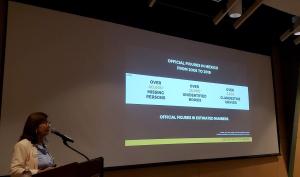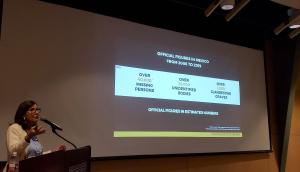Commentaries
The Impact and Legacy of John Lennon
By Len Ellis
December 8, 2023
43 years ago Tuesday, December 8, 1980, John Lennon was shot and killed outside his Upper West Side apartment. The senseless shooting is no less repulsive today than it was then, even in light of all the mass shootings that have occurred over the past 40+ years.
Over the years, when I am reminded of John Lennon, I have to ask – what would the world be like today had he lived? I want to believe it would indeed be a more peaceful planet, at least a more peaceful USA. One cannot underestimate the impact of the thoughts, ideas, and philosophy of Lennon, which eventually was put into words, words that we all could hear and take inside, words that interact with our very being, words that lodge into our brains, into our soul.
Just as words of violence can bring about actions of violence, words of peace can create a space for nonviolence, or in the Gandhian principal of Ahimsa, “a state of the heart which has no enemies.”
Can you imagine a world of no enemies? No perceived reason to harm, let alone kill, another human being? I know John Lennon could, and did. Just look at the words to “Imagine”, key phrases extracted here:
Nothing to kill or die for
No need for greed or hunger
A brotherhood of man
Imagine all the people:
-Living for today,
-Living life in peace,
-Sharing all the world
And the world will live as one
John took his imagination to the next step – he put into words and actions these principles – and we can do the same – our thoughts become our words become our actions. Yet we must go beyond this, we must set an example, teach our children from the moment they are born, how to respect and love one another, how to get along with our brothers and sisters. Yes, we will have conflicts – conflicts are a necessary part of life, but conflicts do not have to be violent! There is always a way to resolve conflict in a nonviolent way – ALWAYS.
I truly believe John Lennon would be leading us today to help eliminate the gun violence we are seeing today. Not by calling for more gun control, but calling for more understanding and tolerance and love for all humanity. He would be writing songs and making public appearances that promoted peace. He would be taking every opportunity to be in the public view, being a model for peace, and most important, asking each and every one of us to do likewise. He would be promoting practices such as Nonviolent Communications (NVC) and Heart Math and Conscious Connections (formerly BePeace). He would be putting his words into actions. And what beautiful words they are.
I invite you to sit quietly, take John Lennon’s words into your head and your heart, and ask yourself “what can I do to make my life one of peace? What can I do to be a model for peace?” And when you get the answer, go forth into the world and show others what is possible. This is how we will create a peaceful planet. Lao Tzu, some 2500 years ago, said it this way:
“If there is to be peace in the world,
There must be peace in the nations.
If there is to be peace in the nations,
There must be peace in the cities.
If there is to be peace in the cities,
There must be peace between neighbors.
If there is to be peace between neighbors,
There must be peace in the home.
If there is to be peace in the home,
There must be peace in the heart.”
And John Lennon reminded us in his own way. Go forth and promote peace, create peace, become peace. It isn’t hard to do.
A Return to the Roots of Mother's Day
By Len Ellis
May 14, 2023
As we recognize and celebrate Mother’s Day, let us first remember and honor Julia Ward Howe. Julia Ward Howe was heartbroken and distressed seeing the ravages of the American Civil War. She wrote “The Battle Hymn of The Republic” as a way to express her anguish and outrage, and saw this was not enough to bring about change. I see her as one of the first feminists, striving to make equality of the sexes a reality. A true visionary, she also saw that peace, the end of war as a way to resolve conflict, was equally as important.
In 1870, the Franco-Prussian war erupted, and Julia Ward Howe began to organize women, her goal to petition Congress to end all wars. A true activist, she took her campaign international, issuing a “Manifesto For Peace” at conferences in Paris and London. In 1872 she put forth and promoted the idea of a “Mother’s Day For Peace” to be celebrated on June 2 each year, and in 1873 women in 18 U.S. cities made this a reality.
Anna Jarvis was another trailblazer during the Civil War, establishing and organizing “Mother’s Work Days.” Julia Ward Howe was directly influenced by Jarvis’ tireless work and activism. Jarvis’ daughter, also named Anna, motivated by her mother’s and Howe’s work for equality and peace, established the first “Mother’s Day” celebration in West Virginia in 1907. Through Jarvis’ activism, by 1912, 45 states had official declarations, and in 1914, President Woodrow Wilson signed the celebration into law.
Within a few years, Jarvis became disappointed with the increasing commercialization of Mother’s Day. In keeping with the intentions of peace and equality and justice, the original purpose of Howe and Jarvis, I invite you to look beyond the ‘feel-good’ façade and ask yourself “how can I honor the work of these visionary and brave women? What can I do to promote peace and equality?” I encourage you to look in the mirror and affirm “Peace Begins With ME!” and then go out into the world and make a difference.
I want to point out that both Howe and Jarvis saw the power in organizing people toward a common goal. While we each have power as individuals, when we come together in a focused purpose, our energy and effect is multiplied many times over. Looking at the peace movement, I believe Howe was the first to put forth an organized effort to end war. Compare this to the thousands of years that humans have used violence and war to address conflict, we’re just now coming into our own as a force for peace. This is why it is so important to support peace-oriented organizations, both financially and physically, to keep the momentum going, to add to the consciousness of peace and nonviolence. As I requested previously, ask yourself how you can get involved, how you can support your local or national peace efforts. Know in your heart – Peace Begins with ME!
A Mexican Mother’s Search for Justice
by José Espericueta
In early October, Lucía Díaz, founder of Colectivo Solecito, and Dr. Matt Hone, an independent researcher, came to Dallas from Veracruz, Mexico to talk about the thousands of disappeared victims of the country’s ongoing drug violence. The particular event that I helped to organize was in collaboration with Doctors Nils Ackerman and Pedro Gonzalez Corona from the University of Texas at Dallas’s Holocaust Studies Center. It was hosted by the University of Dallas and funded in part by the Dallas Peace and Justice Center.

Lucía told the painful story of the disappearance of her son. In 2013, her son Guillermo, a popular DJ with no connection to the drug cartels in Veracruz, was kidnapped and then disappeared. What makes this all the more heartbreaking is noting that Lucia’s wounds have yet to heal because she knows nothing about his whereabouts. Moreover, she has received little help from law enforcement or government officials. The work to find Guillermo has been undertaken by Lucía and mothers like her because this is not just her story, but that of thousands of other mothers whose children have also disappeared throughout Mexico, most of whom are innocent victims of the country’s drug violence.
Rough estimates put the number of disappeared around 40,000. But this number is likely far greater simply because family members are too scared to reach out to police that may be both corrupt and intertwined with powerful drug cartels. Lucía has left her job as a university professor to form Colectivo Solecito (“Little Sun Collective”) and work with other mothers who are searching for information regarding their children. Much of this work involves following tips, digging for mass graves, and providing a support network for the families of those disappeared. They do work that the police refuse to do, risking their own lives in a search for both justice and closure.
